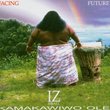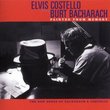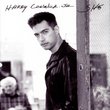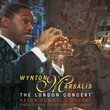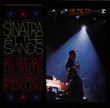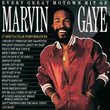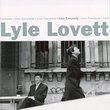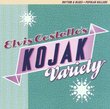| All Artists: Bill Evans Title: Last Waltz: Final Recordings Live Members Wishing: 3 Total Copies: 0 Label: Milestone Original Release Date: 9/27/2000 Re-Release Date: 10/10/2000 Album Type: Box set, Live Genres: Jazz, Pop, Broadway & Vocalists Styles: Cool Jazz, Modern Postbebop, Vocal Jazz, Bebop, Vocal Pop, Traditional Vocal Pop Number of Discs: 8 SwapaCD Credits: 8 UPC: 025218443029 |
Search - Bill Evans :: Last Waltz: Final Recordings Live
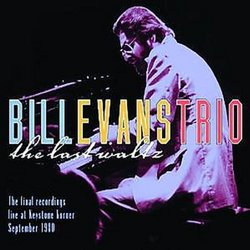 | Bill Evans Last Waltz: Final Recordings Live Genres: Jazz, Pop, Broadway & Vocalists
This eight-CD set was recorded at San Francisco's Keystone Korner between August 31 and September 8, 1980, just a week before Evans's death on September 15. With Evans were bassist Marc Johnson and drummer Joe LaBarbera. I... more » |
Larger Image |
CD DetailsSynopsis
Amazon.com This eight-CD set was recorded at San Francisco's Keystone Korner between August 31 and September 8, 1980, just a week before Evans's death on September 15. With Evans were bassist Marc Johnson and drummer Joe LaBarbera. It was an unusually well-balanced rhythm team for the pianist, perhaps the best combination of talents since he first developed his trio style with Scott LaFaro and Paul Motian two decades before. They provide Evans with responsive support that can shift from the quietest underpinnings to aggressive stimulation. There's often a characteristic movement here from introspective solo passages to vigorous trio dialogues that shows just how hard Evans could swing when he had the right drummer. Largely a final encounter with Evans's key repertoire, the set includes multiple versions of his favorite pieces, like the ballads "But Beautiful," "My Foolish Heart," and "Emily," and his own "Letter to Evan" and "Turn Out the Stars," perennial stimulants for his profound harmonic imagination. But there are also then-recent compositions that never reached the recording studio, like "Yet Ne'er Broken," the repeating "Your Story" with its subtle underlying movement, and "Knit for Mary F." The signature "Nardis" is heard in six different versions, each of them compelling and each a distinct exploration, from a crisp seven-minute version to a concluding performance that stretches to nearly 20. Evans introduces the third version: "We've learned from the potential of the tune, and every once in a while a new gateway opens and it's like therapy." Each of the longer versions is a structure for extended solos by each trio member. Evans's own improvisations are concentrated in extended unaccompanied introductions, stretching to a sublime seven minutes on the final version. The set is a treasure trove for Evans enthusiasts, inviting close and extended listening and rewarding it with the subtlest inventions and variations. There are rare depths here that represent some of his greatest recorded work. --Stuart Broomer Similarly Requested CDs
|
CD ReviewsTerrible Beauty, Grand Closure Samuel Chell | Kenosha,, WI United States | 11/12/2001 (5 out of 5 stars) "These unapproved releases of an extended club date just days before the pianist's death have an undeniably morbid fascination about them. Anyone who really "hears" Bill Evans hears in every note not merely the rapturous lyricism of jazz' most "romantic" poet but the "tragic" sense of beauty's fragility, the pursuit of the elusive and ephemeral moment that Yeats once referred to as "terrible beauty," sublimity purchased at a high price. "Last Waltz" is a remarkable collection of recordings that document the artist's death-defying act but also make apparent an often overlooked dimension of Evans' musical world--his need to communicate. The music on this "last will" is best heard as Evans playing every note not as though his life depended on it but as though his listener's experience mattered as much as his own. During this entire last year, when the pianist appeared to regard every playing date as a "last goodbye," he also attacked his music with a pronounced vigor and uninhibited overstatement that suggest he wanted more than ever for his listeners to get the point. As fascinating as the recordings of the pianist's final year are, they can also be disturbing--discomfiting even to the point of being painful. The recording made of his playing two weeks earlier at Ronnie Scott's in England, especially "Turn Out the Stars," sits somewhere between urgent expression and desperate rhetoric, while the albums made earlier during his final year, especially "The Paris Concert," perhaps come closest to the balance between personal creation and coherent communication that makes Bill Evans' music one of the rarest, most miraculous experiences many of us can lay claim to in a lifetime of listening to music. "The Last Waltz" strikes this listener as the artist's consolidation of the various aspects of his career, a musical question answered by no small measure of acceptance. "My Foolish Heart" (played in the key of A Major!) recalls the fragile beauty of the first 1961 Vanguard recording; "Days of Wine and Roses" achieves a mid-stream F to A-flat modulation that's equal to the headiest improvisations of mid-career Evans; and the 6 explorations of "Nardis" are nothing if they are not revelatory of the pianist's dark and deeply felt affinities with his aesthetic and blood relatives (Bill was half Russian and loved the language)--Moussourgsky, Shostakovich, Dostoevsky, and above all the Tolstoy who wrote "Death of Ivan Ilytch." About this collection it's probably safe to say that it's the most extraordinary valedictory recorded in the history of jazz." Mind-boggling Martin A. Lesser | Ft. Lauderdale, FL USA | 03/29/2001 (5 out of 5 stars) "I purchased this set several months ago. To my suprise, it is perhaps the finest of his works. I have collected most of Evans's recordings over the years. The sound quality is sensational and his feeling for the music is beyond most other musicians. I expected to hear some rushed tempos, but there are none to be found. It is glorious music, Evans at his best. I have a 6 CD changer in my car and four spots are for these CD's. While listening, I am often amazed and astounded by his passion. This is how the piano was meant to be played." Incredible beauty played by a dying man JEAN-MARIE JUIF | BESANCON France | 11/18/2003 (5 out of 5 stars) "Extraordinary.Incredible.Fantastic.Outstanding.
Here are the first half of the last recorded works of Bill Evans (August 16,1929-September 15,1980),one of the most singular of all jazz piano players,and one of the greatest too.The second half of these last recordings can be found in the "consecration" set of 8 CDs;both were recorded at the same time."The last waltz" is composed of the second sets of Bill Evans' concerts,while "consecration" is made of the first sets.All of these CDs were recorded during what will happen to be Evans' last but one gig,at the Keystone Korner,San Francisco,between August 31 and September 8,1980.The last gig,a one week one,which turned to be a two days one,happened at the Fat Tuesday,NYC;after two days of playing,Evans was much too sick to go on,and he died three days later,of bronchial pneumonia and stomachal hemorraging ulcer.The material recorded at Fat Tuesday's has never been released until now. William John Evans died like Lester Young (1909-1959) did,of despair,committing something that can be called a long suicide.One of the tunes that was part of Evans' repertoire during his last years was "Theme from MASH",aka "Suicide is painless". Everyone knew that Bill Evans had strong drug troubles for many and many years;a very sensitive man,who was deeply affected by every life's event.One of the first ones was Scott LaFaro's tragic death,in 1961,ten days after the miraculous "live at the Village Vanguard" session;bassist LaFaro was the perfect partner to Bill's music,and his loss was a tragedy for the pianist. Almost twenty years later,June 1980,he recorded six magnificent CDs ("Turn out the stars",at the Village Vanguard again);he was backed by Marc Johnson,bass,and Joe LaBarbera,who played with him for some two or three years;they both recorded a very great concert,November 26,1979 ("The Paris concert",edition one and two).I think they were perfect partners for Bill;maybe not as great as Scott LaFaro and Paul Motian were in 1961, but 19 years later,Bill Evans,who was dying and who was conscient of that,needed more space to play his music,because he knew that each gig could be the last one.And their discretion,although they play what had to be played,gave Bill the opportunity to denude in public,to let his music explode like it never happened before.Don't mistake,here are (like in the "consecraion" set,or the "turn out the stars" one) some of the most lyrical,and yet emotional music you'll ever listen to.Here are the same skin-deep emotions you can feel in Lester's,or Billie's,or Paul Gonsalves' last recordings. The repertoire,in these second sets at the Keystone Korner,is made of 32 tunes.Here are outstanding versions of "Nardis" (6 versions),here are some new tunes,like "Yet ne'er broken"(an anagram for the name of his drug connection),"Tiffany",dedicated to Joe LaBarbera's daughter,"Letter to Evan",written for his five years old son,or "Knit for Mary F";here are old tunes,"waltz for Debby","turn out the stars","haunted heart";here are wonderful standards,"a sleeping bee"(the lyrics were written by Truman Capote),"Polka dots and monnbeams","Like someone in love","My man's gone now",or Tadd Dameron's "if you could see me now".Here are some eight hours of the most swinging,emotional,and essential music ever played.Bill Evans happened to be one of the most talented jazz pianio players of all times;he also was deeply influenced by classical music,and this is obvious here.Mostly,he was a man who suffered for most of his life;I don't know why.Why was he so affected by each event that happens in every human beeing's life ? Why did he decided to use drugs to try to cancell these pains ? I don't know,neither for Lester or Billie;maybe he was too weak.BUt waht does it means,beeing strong,and able to defy everything and to be unaffected by what happens around you,or beeing weak,and unable to resist to the events of life,and the things which destroy the poor people's life,next door to yours ? Think of all that,while listening to these hours of very great music;the music of a dead man,and a dying man,but a music which is full of life;I own some of 40 records by Bill Evans,but here are the most essential recordings he made.Here is a set each and every jazz lover should own.A real treasure." |

 Track Listings (8) - Disc #1
Track Listings (8) - Disc #1